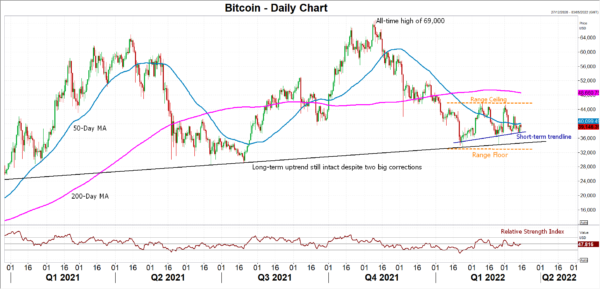Bitcoin has been trading in a range since late January when fears about sky-high inflation took hold over the markets and tensions between Russia and Ukraine first started to escalate. The sideways pattern isn’t showing any signs of breaking up, so why is the price so unusually disciplined at such a tumultuous period for financial markets?
The halving effect
The price of Bitcoin – still the largest cryptocurrency by market cap – exploded higher in 2020 and 2021. Whilst the rising popularity of Bitcoin, both as an asset class as well as its use as a payment method, undoubtedly magnified this spectacular growth, the main driving force behind this rally was likely the halving that takes place every four years, and which last happened in May 2020.
In previous such occasions in 2012 and 2016, the price also rallied, though, with a slightly longer lag from the date of halving, which was then followed by a steep correction. Within this context, Bitcoin’s downfall from its all-time high of $69,000 set in November 2021 is to have been expected. Nonetheless it’s still very puzzling why Bitcoin and the other major cryptocurrencies have been consolidating for so long when volatility has been extremely elevated in the broader markets.
Not much of a safe haven
The price bottomed at a six-month low of $32,950.72 on January 24, halting a two-month slide. But despite some very choppy trading since then amidst the geopolitical storm with Ukraine, it has been unable to rise further than $45,850 or even brush new lows, instead fluctuating around $39,000.
Many market pundits were hoping that Bitcoin would shine as a safe haven from the war. But although cryptocurrencies have come under the spotlight, with the Ukrainian government encouraging donations in cryptos and many Russians using them to evade sanctions, the latter may also be having the opposite effect. Some wealthy Russians are reportedly liquidating their digital coins as they find themselves frozen out of their other assets due to Western sanctions.
Bitcoin’s increasing adoption by institutional investors may also be working against it as the fact that it has not proven to be a good inflation hedge nor a ‘digital gold’ during this torrid time for the markets suggests portfolio managers see it mostly as a speculative trade than anything else.
Regulatory worries have eased lately
On the positive side, both the European Union and United States seem to be only taking baby steps as far as regulating cryptocurrencies is concerned. All the indications are that most governments don’t want to stifle innovation in the field of digital currencies and blockchain technology despite ongoing concerns about fraud and money laundering. This bodes well for Bitcoin, at least in the medium term.
When factoring in all these different forces, it appears that they are negating each other. But what could also be keeping the floor and ceiling of the range in place is dip buyers stepping in to take advantage of the discounted price, while those that entered the market when Bitcoin was near record highs are possibly selling it at every opportunity that the price spikes higher to minimize their losses.
Is the price getting ready for an upside break?
It is encouraging to note, however, that during this consolidation phase, not only is the long-term ascending trendline still in place, but a short-term uptrend has also been forming. With momentum indicators like the Relative Strength Index (RSI) looking fairly neutral, an upward push seems more likely than a downward one, assuming of course that the 50-day moving average doesn’t get in the way.

